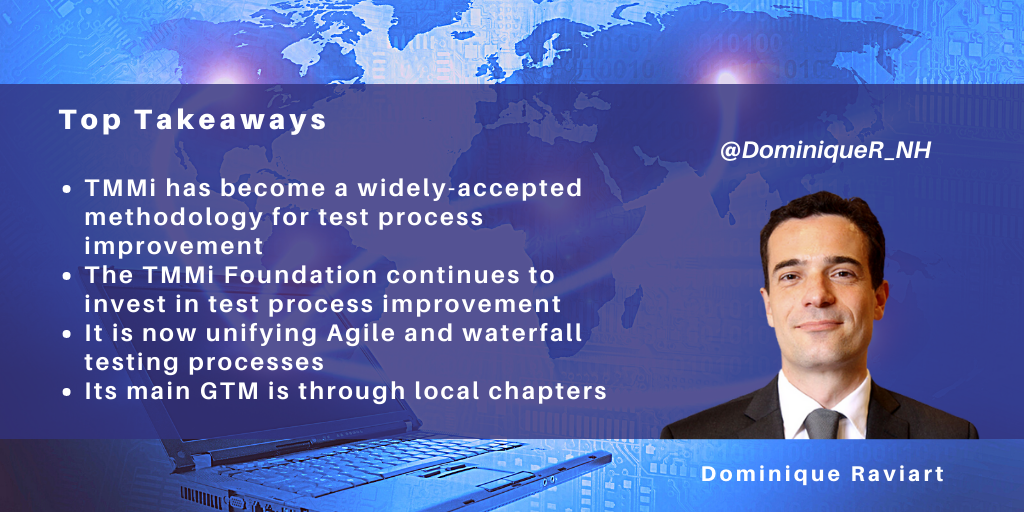posted on Feb 11, 2022 by Dominique Raviart

We recently talked to Erik van Veenendaal, the head of the TMMi Foundation, which promotes the TMMi QA process improvement methodologies.
TMMi Has Become A Widely-Accepted Methodology for Test Process Improvement
Founded in 2005, the TMMi Foundation is a not-for-profit organization focused on improving corporate test processes. It launched its TMMi methodologies at a time when organizations were beginning to formally structure their QA units and introduce best practices to increase productivity and quality in testing.
The Foundation decided not to address each tester's training and certification needs; it has an alliance for this with ISTQB, which remains the worldwide reference for QA training.
TMMi quickly became one of the two best-known testing process improvement methodologies. Its sphere of influence has gone beyond the number of certified organizations (250 globally). Many organizations have downloaded TMMi methodologies or purchased the books without formal certification. TMMi thus has gained an influence over QA that exceeds its client base.
Despite its share of mind success, the TMMi Foundation has faced challenges. One is the fast adoption of Agile methods; another is internal to the TMMi Foundation managing growth.
TMMi Foundations Updates its Methodologies & Books
The TMMi Foundation updated its methodologies and books to Agile. With the adoption of Agile, many organizations moved away from a process approach to transforming their QA. The TMMi Foundation continues to educate clients about the benefits of bringing a structured QA approach to agile development. Also, it launched an Agile version of its process methodology in 2015.
The Foundation is now developing a unified Agile and waterfall method. And the new methodology planned for 2024 will go beyond merging Agile and waterfall, with TMMi looking at including best practices and roadmaps around automation and AI.
Measuring TMMi's Benefits
Beyond refreshing its books and methodologies, the TMMi Foundation started to measure the impact of deploying its methodologies among certified organizations. The Foundation worked with the Universities of Belfast and Innsbruck, sending its questionnaire to organizations in its client database. The response rate of 64% provided a good level of accuracy.
The survey's findings show the effectiveness of TMMi. Approximately 90% of respondents expressed their satisfaction. Nearly three quarters (73%) of respondents reported that TMMi drove software quality improvement. However, TMMi does not lead to QA project reduction.
The survey also sheds some light on the TMMi corporate user population. Financial services, the largest spender on QA globally, is also the primary user (37%). Second is QA services/IT services vendors (30%). The remaining 33% span industries. Beyond improving the test process, QA organizations also use TMMi to demonstrate their capabilities, internally or to third parties, for regulatory compliance. Client organizations use, therefore, certification to showcase their QA transformation too.
Defining Clear Roles While Pushing its Service Ecosystem
In its expansion effort, the TMMi Foundation has also redefined roles and relationships with the TMMi ecosystem of partners. The Foundation plays a central role in methodologies and syllabi (for training). It is also the certification entity for client organizations undergoing TMMi assessment (through a sample approach). The TMMi Foundation also provides accreditations ifor training and assessment service providers and certifies individuals, e.g., as TMMi (Lead) Assessor.
The Foundation believes that partners will play a crucial role in such expansion, starting with local partners, i.e., the 'chapters'. These chapters drive TMMi's localization and marketing. They address testers at the individual level, and ensure training such as TMMi Professional training and certification (for testers who want to learn about TMMi methodologies) is available locally. The chapters also make sure testers at the corporate level who conduct consulting (Test Process Improver) or assess QA organizations (Accredited Assessor, Accredited Lead Assessor) are trained. They also advise QA consultancies that want to become training or assessment partners.
Currently, the Foundation has 23 chapters operating in 51 countries. Its local partners have a widespread presence across the continents. The TMMi Foundation realizes it still needs to strengthen its geographical footprint. It will announce a partner in Germany soon.
To sustain its local partner expansion, the Foundation shares half of its certification and accreditation fees back to the local chapters, intending to grow their marketing initiatives. Beyond recruiting new chapters, the TMMi Foundation wants to increase its activity level in each geography where it is present. The growth potential is significant.
The Need for Structured QA Remains
We find that TMMi's renewed expansion and international effort come at an opportune time. Agile is driving functional testing and beyond as part of continuous testing. Organizations are only transitioning and require help and consulting services for this journey.
AI is the next paradigm shift. AI-based analytics provide the Foundation with better-informed QA decisions and more focused testing. AI-based automation will drive the self-generation of test scripts. With technology evolving so far, QA organizations will need to resume a disciplined approach to QA while coping with Agile's decentralized QA needs.
